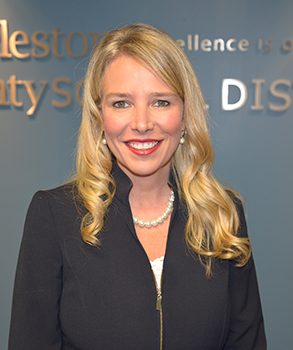Huggins recommends weighted student funding model, increased pay for employees, cuts to administration
March 12, 2024Charleston County School District (CCSD) Superintendent of Schools Anita Huggins and district staff members presented a new budget model designed to provide more resources to schools. Huggins also proposed an increase in pay for teachers and all staff while making cuts to the district administration and non-school-based administrative costs for the Fiscal Year 2025 budget. The budget proposal was presented to the CCSD Board of Trustees Monday afternoon.
The groundbreaking model described below establishes a new weighted student-based funding formula rooted in the belief that CCSD must provide schools and their students with the fiscal support necessary to ensure all students in CCSD read on grade level in the 5th grade, that middle school students are Algebra I ready and successful, and that all students exit its system college/career ready. It is grounded in the principle that CCSD must responsibly resource schools to allow for school autonomy coupled with accountability for positive student outcomes.
The proposals included a weighted student-based funding (WSF) model to provide additional resources in all schools. Huggins’ budget also proposed an increase in pay for employees throughout the CCSD and recommended $8 million in budget cuts to non-school-based administrative positions and costs.
Weighted student-based funding model
Huggins and district staff members are asking the Board of Trustees to consider a WSF model that would provide more support to schools in order to sustain the positive momentum related to student outcomes in CCSD. The formula would be determined by the number of pupils in poverty, students receiving special education services, and multilingual learners. The desired impact of this formula would allow the district to maintain effective programs and positions previously funded by ESSER, to increase support for all students, and to increase school autonomy.
The initial projected increase to the district’s General Operating Fund for FY 2025, related to ESSER sustainability and WSF considerations, is $30.2 million, only 12% of the nearly $250 million dollars received through ESSER.
 “I believe this funding model will be a game-changer for student outcomes in CCSD,” Huggins explained. “I am excited to work alongside our Board members to resource schools differently, in outside-of-the-box ways, empowering principals and teachers to believe they can make the most difference for our diverse groups of students. A focus on children and their needs will be paramount as we collaborate not only around the FY25 budget but also around a three-year sustainable budget model.”
“I believe this funding model will be a game-changer for student outcomes in CCSD,” Huggins explained. “I am excited to work alongside our Board members to resource schools differently, in outside-of-the-box ways, empowering principals and teachers to believe they can make the most difference for our diverse groups of students. A focus on children and their needs will be paramount as we collaborate not only around the FY25 budget but also around a three-year sustainable budget model.”
Increased pay for CCSD staff
The presentation to the Board of Trustees included increases in the district’s teacher salary schedule based on the possible increments listed below up to 40 years of experience (known as a STEP), as well as a STEP increase for teachers, cost of living adjustments for non-teachers, and step increases for non-teachers as outlined below.
The following three increases to the teacher salary schedule, which now goes to Step 40, were provided to the Board for consideration:
- $5,000 plus fringe benefits (would cost $24.1 million) – would increase beginning teacher pay to $53,146.60
- $4,500 plus fringe benefits (would cost $21.7 million) – – would increase beginning teacher pay to $52,646.60
- $2,500 plus fringe benefits (would cost $12.05 million) – would increase beginning teacher pay to $50,646.60.
The information also included the following proposals to raise pay for non-teachers in the district, ranging from cost-of-living adjustments (COLAs) to Step increases:
- 5.0 percent COLA (would cost $10.45 million)
- 4.0 percent COLA (would cost $8.3 million)
- 3.0 percent COLA (would cost $6.3 million)
- 1.9 percent COLA (would cost $2.7 million)
- Increasing the salary schedule to Step 32 (would cost $727K)
- Increasing the salary schedule to Step 33 (would cost $1.5 million)
- Upgrades for school-based classified positions (would cost $5 million)
For additional information, contact the Office of Communications at (843) 937-6303.





















